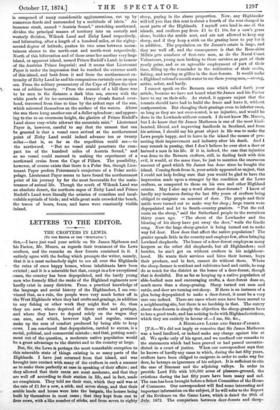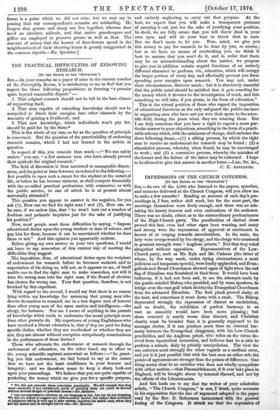LETTERS TO THE EDITOR.
THE CROFTERS IN LEWIS.
[TO THE EDITOR OF THE SPECTATOR:]
have just read your article on Sir James Matheson and Iris Factor, Mr. Munro, as regards their treatment of the Lews *crofters, and the remarks on deer forests contained in it. I entirely agree with the feeling which prompts the writer, namely, that it is a most melancholy sight to see all over the Highlands the ruins of once happy homes, whose inhabitants have been .evicted ; and it is a miserable fact that, except in a few exceptional .cases, the country has been depopulated, and the hardy young men who formely filled the ranks of the Highland regiments now hardly exist in many districts. From a practical knowledge of the language and social history of the Highlanders, I am con- vinced that, as a rule, the people were very much better off in -the West Highlands when they had crofts and grazings, in addition to any fishing or other work they might find to do, than -they are now, where deprived of these crofts and grazings, and where they have to depend solely on the wages they 'can earn, and which, however high and regular, cannot snake up the sum of comfort produced by being able to keep .cows. I am convinced that depopulation, carried to excess, is a social, political, and commercial mistake ; and that, putting senti- ment out of the question, a moderate native population would be a great advantage to the district and to the country at large.
But, Sir, the Lews is perhaps the most remarkable exception to this miserable state of things existing in so many parts of the Highlands. I have just returned from that island, and was brought into contact with many of the crofters in such a manner as to make them perfectly at ease in speaking of their affairs ; and they allowed that their rents are most moderate, and that they are well off according to their station in life, and in fact, made no complaints. They told me their rent, which they said was at the rate of £1 for a cow, a stirk, and seven sheep, and that their arable lands and house were into the bargain, the houses being built by themselves in most cases ; that they kept from one to four cows, with a like number of stirks, and from seven to eighty sheep, paying in the above proportion. Now, any Highlander will tell you that this rent is about a fourth of the rent charged in most parts of the Highlands. I myself own land in one of the islands, and crofters pay from £1 to £1 10s. for a cow's grass alone, besides the arable rent, and are not allowed to keep any sheep, and if they keep a stirk on the grazing have to pay for it in addition. The population on Sir James's estate is large, and they are well off, and the consequence is that the Ross-shire Militia gets numbers of first-rate men, as do the Naval Coast Volunteers, young men looking to these services as part of their yearly gains, and as an agreeable employment of part of their time, filling up the remainder in the cultivation of their crofts, fishing, and serving as gillies in the deer-forests. It would make a Highland colonel's mouth water to see these young men,—strong, active, sober, and hardy.
I cannot speak on the Bernera case which called forth your article, because we have not heard what Sir James and his Factor have to say on their side. As stated, it appears unjust that the tenants should have had to build the fence and leave it, without conipensation. But changing their grazings even to inferior ones, so long as they are not over-rented, is no injustice, and would be done in the Lowlands without remark. I do not know Mr. Munro, but I do know that Sir James Matheson is one of the most kind- hearted, liberal, and improving landlords in Scotland, and from his actions, I should say his great object in life was to make the Lews people happy, and to leave in the island the means of pro- moting their improvement and industry after his death. And I may remark in passing, that .I don't believe he ever shot a deer or harmed a man in his life. If it is, indeed, the case that injustice was done to the Bernera crofters, still, in finding fault with this evil, it would, at the same time, be just to mention the enormous amount of good which Sir James has done since he bought the Wand. Coming fresh from it, your article appeared so unjust, that I could not help feeling sure that you would be glad to have the impression made upon a stranger by the condition of the Lews crofters, as compared to those on his own and other Highland estates. May I also say a word about deer-forests ? I know of hardly any instances during the last fifty years of crofters being obliged to emigrate on account of deer. The people and their cattle were turned out to make way for sheep ; large tracts were depopulated and let to South-country graziers. "Put the red coats on the sheep," said the Sutherland people to the recruiters thirty years ago. "The shout of the Lowlander and the bleating of his sheep have put away the deer," wails the Gaelic song. Now the large sheep-grazier is being turned out to make way foi deer. How does that affect the native population? The grazier spends little in the country and employs few, often bringing Lowland shepherds. The lessee of a deer-forest employs as many keepers as the other did shepherds, but all Highlanders ; and besides, he can't get on without crofters in his neighbour- hood. He wants their services and hires their horses, buys their produce, and in fact, cannot do without them. Where the sheep-farmer is resident and cultivates land and cattle, he may do as much for the district as the lessee of a deer-forest, though that is doubtful. But as far as keeping up a native population of able-bodied men and encouraging crofts, a deer-forest does so, much more than a sheep-grazing. Sheep turned out men and cattle, and deer are turning out sheep. If there is an instance of a glen being depopulated to make a deer-forest, it must be a very rare one indeed. There are cases where men have been moved to a neighbouring site, but there is no hardship in that. The outcry about deer-forests is simply the objection the sheep-graziers have to lose a good trade, and has nothing to do with Highland evictions, which they are entirely in favour of.—I am, Sir, &c., A HIGHLAND LAIRD AND SHEEP-FARMER. [P.S.—We did not imply or conceive that Sir James Matheson was a hard landlord, or indeed make any charge against him at
all. We spoke only of his agent, and we confined our remarks to the statements which had been proved or had passed uncontra- dicted in a court of justice. When our correspondent says that
he knows of hardly any cases in which, during the last fifty years, crofters have been obliged to emigrate in order to make way for
deer, he betrays an ignorance of his subject. It is sufficient to cite the case of Braemar and the adjoining valleys. In order to provide Lord Fife with 100,000 acres of pleasure-ground, the evictions during the last fifty years have been many and sad.
The case has been brought before a Select Committee of the House of Commons. Our correspondent will find some interesting and important information on the subject, if he will refer to the Report of the Evidence on the Game Laws, which is dated the 26th of July, 1872. The comparison between deer-forests and sheep- farms is a point which we did not raise, but we may say in passing that our correspondent's remarks are misleading. He forgets that grouse and sheep can live together, whereas deer need an absolute solitude, and that native gamekeepers and gillies are employed to preserve grouse as well as deer. The amount of money that the lessees of deer-forests spend in the neighbourhood of their shooting-boxes is grossly exaggerated in the common reports.—En. Spectator.]



































 Previous page
Previous page